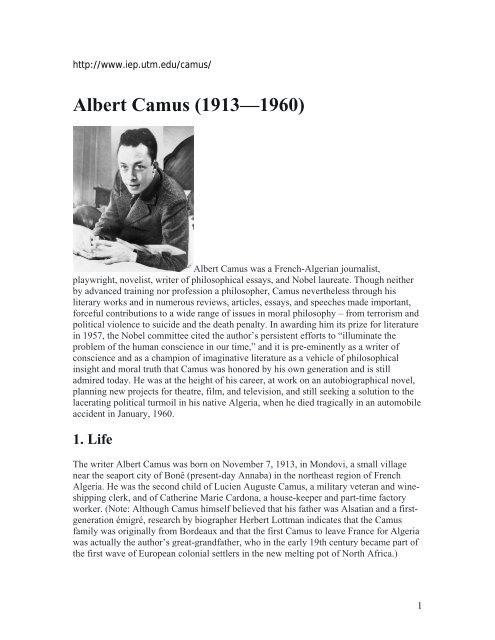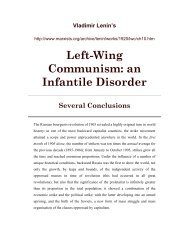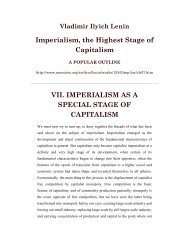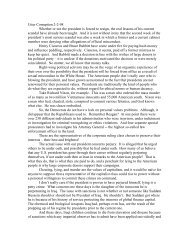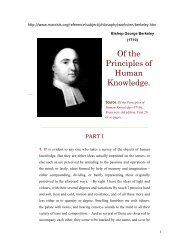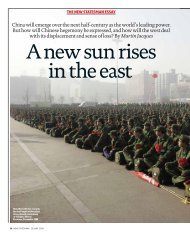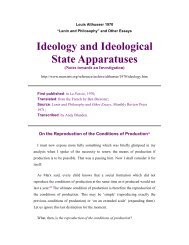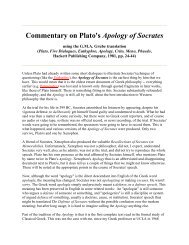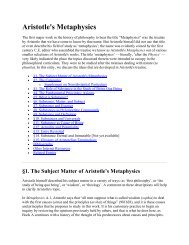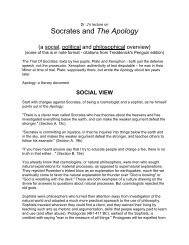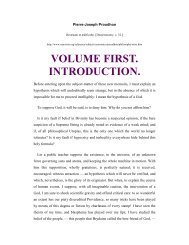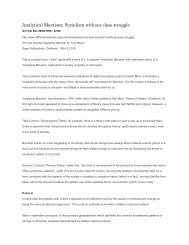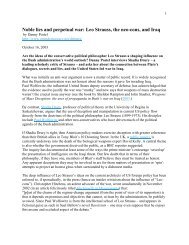Albert Camus (1913â1960) - Richard Curtis
Albert Camus (1913â1960) - Richard Curtis
Albert Camus (1913â1960) - Richard Curtis
You also want an ePaper? Increase the reach of your titles
YUMPU automatically turns print PDFs into web optimized ePapers that Google loves.
http://www.iep.utm.edu/camus/<br />
<strong>Albert</strong> <strong>Camus</strong> (1913—1960)<br />
<strong>Albert</strong> <strong>Camus</strong> was a French-Algerian journalist,<br />
playwright, novelist, writer of philosophical essays, and Nobel laureate. Though neither<br />
by advanced training nor profession a philosopher, <strong>Camus</strong> nevertheless through his<br />
literary works and in numerous reviews, articles, essays, and speeches made important,<br />
forceful contributions to a wide range of issues in moral philosophy – from terrorism and<br />
political violence to suicide and the death penalty. In awarding him its prize for literature<br />
in 1957, the Nobel committee cited the author’s persistent efforts to “illuminate the<br />
problem of the human conscience in our time,” and it is pre-eminently as a writer of<br />
conscience and as a champion of imaginative literature as a vehicle of philosophical<br />
insight and moral truth that <strong>Camus</strong> was honored by his own generation and is still<br />
admired today. He was at the height of his career, at work on an autobiographical novel,<br />
planning new projects for theatre, film, and television, and still seeking a solution to the<br />
lacerating political turmoil in his native Algeria, when he died tragically in an automobile<br />
accident in January, 1960.<br />
1. Life<br />
The writer <strong>Albert</strong> <strong>Camus</strong> was born on November 7, 1913, in Mondovi, a small village<br />
near the seaport city of Bonê (present-day Annaba) in the northeast region of French<br />
Algeria. He was the second child of Lucien Auguste <strong>Camus</strong>, a military veteran and wineshipping<br />
clerk, and of Catherine Marie Cardona, a house-keeper and part-time factory<br />
worker. (Note: Although <strong>Camus</strong> himself believed that his father was Alsatian and a firstgeneration<br />
émigré, research by biographer Herbert Lottman indicates that the <strong>Camus</strong><br />
family was originally from Bordeaux and that the first <strong>Camus</strong> to leave France for Algeria<br />
was actually the author’s great-grandfather, who in the early 19th century became part of<br />
the first wave of European colonial settlers in the new melting pot of North Africa.)<br />
1
Shortly after the outbreak of WWI, when <strong>Camus</strong> was less than a year old, his father was<br />
recalled to military service and on October 11, 1914, died of shrapnel wounds suffered at<br />
the first battle of the Marne. As a child, about the only thing <strong>Camus</strong> ever learned about<br />
his father was that he had once become violently ill after witnessing a public execution.<br />
This anecdote, which surfaces in fictional form in the author’s novel L’Etranger and<br />
which is also recounted in his philosophical essay “Reflections on the Guillotine,”<br />
strongly affected <strong>Camus</strong> and influenced his own lifelong opposition to the death penalty.<br />
After his father’s death, <strong>Camus</strong>, his mother, and older brother moved to Algiers where<br />
they lived with his maternal uncle and grandmother in her cramped second-floor<br />
apartment in the working-class district of Belcourt. <strong>Camus</strong>’ mother Catherine, who was<br />
illiterate, partially deaf, and afflicted with a speech pathology, worked in an ammunition<br />
factory and cleaned homes to help support the family. In his posthumously published<br />
autobiographical novel The First Man, <strong>Camus</strong> recalls this period of his life with a<br />
mixture of pain and affection as he describes conditions of harsh poverty (the three-room<br />
apartment had no bathroom, no electricity, and no running water) relieved by hunting<br />
trips, family outings, childhood games, and scenic flashes of sun, seashore, mountain, and<br />
desert.<br />
<strong>Camus</strong> attended elementary school at the local Ecole Communale, and it was there that<br />
he encountered the first in a series of teacher-mentors who recognized and nurtured the<br />
young boy’s lively intelligence. These father-figures introduced him to a new world of<br />
history and imagination and to literary landscapes far beyond the dusty streets of Belcourt<br />
and working-class poverty. Though stigmatized as a pupille de la nation (that is, a war<br />
veteran’s child dependent on public welfare) and hampered by recurrent health issues,<br />
<strong>Camus</strong> distinguished himself as a student and was eventually awarded a scholarship to<br />
attend high school at the Grand Lycee. Located near the famous Kasbah district, the<br />
school brought him into close proximity with the native Moslem community and thus to<br />
an early recognition of the idea of the “outsider” that would dominate his later writings.<br />
It was during his high school years that <strong>Camus</strong> became an avid reader (absorbing Gide,<br />
Proust, Verlaine, and Bergson, among others), learned Latin and English, and developed<br />
a lifelong interest in literature, art, theatre, and film. He also enjoyed sports, especially<br />
soccer, of which he once wrote (recalling his early experience as a goal-keeper): “I<br />
learned . . . that a ball never arrives from the direction you expected it. That helped me in<br />
later life, especially in mainland France, where nobody plays straight.” It was also during<br />
this period that <strong>Camus</strong> suffered his first serious attack of tuberculosis, a disease that was<br />
to afflict him, on and off, throughout his career.<br />
By the time he finished his Baccalauréat degree (June, 1932), <strong>Camus</strong> was already<br />
contributing articles to Sud, a literary monthly, and looking forward to a career in<br />
journalism, the arts, or higher education. The next four years (1933-37) were an<br />
especially busy period in his life, during which he attended college, worked at odd jobs,<br />
married his first wife (Simone Hié), divorced, briefly joined the Communist party, and<br />
effectively began his professional theatrical and writing career. Among his various<br />
employments during the time were stints of routine office work (one job consisted of a<br />
2
Bartleby-like recording and sifting of meteorological data; another involved papershuffling<br />
in an auto license bureau), and one can well imagine that it was during this<br />
period that his famous conceptions of Sisyphean struggle and of heroic defiance in the<br />
face of the Absurd first began to take shape within his imagination.<br />
In 1933 <strong>Camus</strong> enrolled at the University of Algiers to pursue his diplome d’etudes<br />
superieures, specializing in philosophy and gaining certificates in sociology and<br />
psychology along the way. In 1936 he became a co-founder along with a group of young<br />
fellow intellectuals of the Théâtre du Travail, a professional acting company specializing<br />
in drama with left-wing political themes. <strong>Camus</strong> served the company as both an actor and<br />
director and also contributed scripts, including his first published play Revolt in Asturia, a<br />
drama based on an ill-fated workers’ revolt during the Spanish Civil War. That same year<br />
<strong>Camus</strong> also earned his degree and completed his dissertation, a study of the influence of<br />
Plotinus and neo-Platonism on the thought and writings of St. Augustine.<br />
Over the next three years <strong>Camus</strong> further established himself as an emerging author,<br />
journalist, and theatre professional. After his disillusionment with and eventual expulsion<br />
from the Communist Party, he reorganized his dramatic company and renamed it the<br />
Théâtre de l’Equipe (literally the Theater of the Team). The name change signaled a new<br />
emphasis on classic drama and avant-garde aesthetics and a shift away from labor politics<br />
and agitprop. In 1938 he joined the staff of a new daily newspaper, the Alger<br />
Républicain, where his assignments as a reporter and reviewer covered everything from<br />
contemporary European literature to local political trials. It was during this period that he<br />
also published his first two literary works – L’Envers et l’endroit (Betwixt and Between),<br />
a collection of five short semi-autobiographical and philosophical pieces (1937) and<br />
Noces (Nuptials), a series of lyrical celebrations interspersed with wistful political and<br />
philosophical reflections on North Africa and the Mediterranean.<br />
The 1940’s witnessed <strong>Camus</strong>’ gradual ascendance to the rank of world-class literary<br />
intellectual. He started the decade as a locally acclaimed author and playwright, but a<br />
figure virtually unknown outside the city of Algiers. He ended it as an internationally<br />
recognized novelist, dramatist, journalist, philosophical essayist, and champion of<br />
freedom. This period of his life began inauspiciously – war in Europe, the occupation of<br />
France, official censorship, and a widening crackdown on left-wing journals. <strong>Camus</strong> was<br />
still without stable employment or steady income when, after marrying his second wife,<br />
Francine Faure, in December of 1940, he departed Lyons, where he had been working as<br />
a journalist, and returned to Algeria. To help make ends meet, he taught part-time<br />
(French history and geography) at a private school in Oran. All the while he was putting<br />
finishing touches to his first novel L’Etranger (The Stranger), which was finally<br />
published in 1942 to favorable critical response, including a lengthy and penetrating<br />
review by Jean-Paul Sartre. The novel propelled him into immediate literary renown.<br />
<strong>Camus</strong> returned to France in 1942 and a year later began working for the clandestine<br />
newspaper Combat, the journalistic arm and voice of the French Resistance movement.<br />
During this period, while contending with recurrent bouts of tuberculosis, he also<br />
published Le Mythe de Sisyphe (The Myth of Sisyphus), his philosophical anatomy of<br />
3
suicide and the absurd, and joined Gallimard Publishing as an editor, a position he held<br />
until his death.<br />
After the Liberation, <strong>Camus</strong> continued as editor of Combat, oversaw the production and<br />
publication of two plays, Le Malentendu (The Misunderstanding) and Caligula, and<br />
assumed a leading role in Parisian intellectual society in the company of Sartre and<br />
Simone de Beauvoir among others. In the late 40’s his growing reputation as a writer and<br />
thinker was enlarged by the publication of La Peste (The Plague), an allegorical novel<br />
and fictional parable of the Nazi Occupation and the duty of revolt, and by lecture tours<br />
to the United States and South America. In 1951 he published L’Homme Revolte (The<br />
Rebel), a reflection on the nature of freedom and rebellion and a philosophical critique of<br />
revolutionary violence. This powerful and controversial work, with its explicit<br />
condemnation of Marxism-Leninism and its emphatic denunciation of unrestrained<br />
violence as a means of human liberation, led to an eventual falling out with Sartre and to<br />
his being branded a reactionary in the view of many European Communists. Yet it also<br />
established him as an outspoken champion of individual freedom and as an impassioned<br />
critic of tyranny and terrorism, whether practiced by the Left or by the Right.<br />
In 1956, <strong>Camus</strong> published La Chute (The Fall), the short, confessional novel, which<br />
unfortunately would be the last of his completed major works and which in the opinion of<br />
some critics is the most elegant, and most under-rated, of all his books. During this period<br />
he was still afflicted by tuberculosis and was perhaps even more sorely beset by the<br />
deteriorating political situation (which had by now escalated from demonstrations and<br />
occasional terrorist and guerilla attacks into open violence and insurrection) in his native<br />
Algeria. <strong>Camus</strong> still hoped to champion some kind of rapprochement that would allow<br />
the native Moslem population and the French pied noir minority to live together<br />
peaceably in a new de-colonized and largely integrated, if not fully independent, nation.<br />
Alas, by this point, as he himself must have painfully recognized, the odds of such an<br />
outcome were becoming increasingly unlikely.<br />
In the fall of 1957, following publication of L’Exil et le Royaume (Exile and the<br />
Kingdom), a collection of short fiction, <strong>Camus</strong> was shocked by news that he had been<br />
awarded the Nobel prize for literature. He absorbed the announcement with mixed<br />
feelings of gratitude, humility, and amazement. On the one hand, the award was<br />
obviously a tremendous honor. On the other, not only did he feel that his friend and<br />
esteemed fellow novelist Andre Malraux was more deserving, he was also aware that the<br />
Nobel itself was widely regarded as the kind of accolade usually given to artists at the<br />
end of a long career. Yet, as he indicated in his acceptance speech at Stockholm, he<br />
considered his own career as still in mid-flight, with much yet to accomplish and even<br />
greater writing challenges ahead:<br />
. . . Every person, and assuredly every artist, wants to be recognized. So do I. But I have<br />
been unable to comprehend your decision without comparing its resounding impact with<br />
my own actual status. A man almost young, rich only in his doubts, and with his work<br />
still in progress. . . how could such a man not feel a kind of panic at hearing the decree<br />
that transports him all of a sudden. . . to the center of a glaring spotlight? And with what<br />
4
feelings could he accept this honor at a time when other writers in Europe, among them<br />
the very greatest, are condemned to silence, and even at a time when the country of his<br />
birth is going through unending misery?<br />
Of course <strong>Camus</strong> could not have known as he spoke these words that most of his writing<br />
career was in fact behind him. Over the next two years, he published articles and<br />
continued to write, produce, and direct plays, including his own adaptation of<br />
Dostoyevsky’s The Possessed. He also formulated new concepts for film and television,<br />
assumed a leadership role in a new experimental national theater, and continued to<br />
campaign for peace and a political solution in Algeria. Unfortunately, none of these latter<br />
projects would be brought to fulfillment. On January 4th of 1960, <strong>Camus</strong> died tragically<br />
in a car accident while a passenger in a vehicle driven by his friend and publisher Michel<br />
Gallimard, who also suffered fatal injuries. The author was buried in the local cemetery at<br />
Lourmarin, a village in Provencal where he and his wife and daughters had lived for<br />
nearly a decade.<br />
Upon hearing of <strong>Camus</strong>’ death, Sartre wrote a moving eulogy in the France-Observateur,<br />
saluting his former friend and political adversary not only for his distinguished<br />
contributions to French literature but especially for the heroic moral courage and<br />
“stubborn humanism” which he brought to bear against the “massive and deformed<br />
events of the day.”<br />
2. Literary Career<br />
According to Sartre’s perceptive appraisal, <strong>Camus</strong> was less a novelist than a writer of<br />
philosophical tales and parables in the tradition of Voltaire. This assessment accords with<br />
<strong>Camus</strong>’ own judgment that his fictional works were not true novels (Fr. romans), a form<br />
he associated with the densely populated and richly detailed social panoramas of writers<br />
like Balzac, Tolstoy, and Proust, but rather contes (“tales”) and recits (“narratives”)<br />
combining philosophical and psychological insights.<br />
In this respect, it is also worth noting that at no time in his career did <strong>Camus</strong> ever<br />
describe himself as a deep thinker or lay claim to the title of philosopher. Instead, he<br />
nearly always referred to himself simply, yet proudly, as un ecrivain – a writer. This is an<br />
important fact to keep in mind when assessing his place in intellectual history and in<br />
twentieth-century philosophy. For by no means does he qualify as a system-builder or<br />
theorist or even as a disciplined thinker. He was instead (and here again Sartre’s<br />
assessment is astute) a sort of all-purpose critic and modern-day philosophe: a debunker<br />
of mythologies, a critic of fraud and superstition, an enemy of terror, a voice of reason<br />
and compassion, and an outspoken defender of freedom – all in all a figure very much in<br />
the Enlightenment tradition of Voltaire and Diderot. For this reason, in assessing <strong>Camus</strong>’<br />
career and work, it may be best simply to take him at his own word and characterize him<br />
first and foremost as a writer – advisedly attaching the epithet philosophical for sharper<br />
accuracy and definition.<br />
5
3. <strong>Camus</strong>, Philosophical Literature, and the Novel of<br />
Ideas<br />
To pin down exactly why and in what distinctive sense <strong>Camus</strong> may be termed a<br />
philosophical writer, we can begin by comparing him with other authors who have<br />
merited the designation. Right away, we can eliminate any comparison with the efforts of<br />
Lucretius and Dante, who undertook to unfold entire cosmologies and philosophical<br />
systems in epic verse. <strong>Camus</strong> obviously attempted nothing of the sort. On the other hand,<br />
we can draw at least a limited comparison between <strong>Camus</strong> and writers like Pascal,<br />
Kierkegaard, and Nietzsche – that is, with writers who were first of all philosophers or<br />
religious writers, but whose stylistic achievements and literary flair gained them a special<br />
place in the pantheon of world literature as well. Here we may note that <strong>Camus</strong> himself<br />
was very conscious of his debt to Kierkegaard and Nietzsche (especially in the style and<br />
structure of The Myth of Sisyphus and The Rebel) and that he might very well have<br />
followed in their literary-philosophical footsteps if his tuberculosis had not side-tracked<br />
him into fiction and journalism and prevented him from pursuing an academic career.<br />
Perhaps <strong>Camus</strong> himself best defined his own particular status as a philosophical writer<br />
when he wrote (with authors like Melville, Stendhal, Dostoyevsky, and Kafka especially<br />
in mind): “The great novelists are philosophical novelists”; that is, writers who eschew<br />
systematic explanation and create their discourse using “images instead of arguments.”<br />
(The Myth of Sisyphus, p.74.)<br />
By his own definition then <strong>Camus</strong> is a philosophical writer in the sense that he has (a)<br />
conceived his own distinctive and original world-view and (b) sought to convey that view<br />
mainly through images, fictional characters and events, and dramatic presentation rather<br />
than through critical analysis and direct discourse. He is also both a novelist of ideas and<br />
a psychological novelist. And in this respect he certainly compares most closely to<br />
Dostoyevsky and Sartre, two other writers who combine a unique and distinctly<br />
philosophical outlook, acute psychological insight, and a dramatic style of presentation.<br />
(Like <strong>Camus</strong>, Sartre was a productive playwright, and Dostoyevsky remains perhaps the<br />
most dramatic of all novelists, as <strong>Camus</strong> himself seems to have realized, having adapted<br />
both The Brothers Karamazov and The Possessed for the stage.)<br />
4. Works<br />
<strong>Camus</strong>’ reputation rests largely on the three novels published during his lifetime (The<br />
Stranger, The Plague, and The Fall) and on his two major philosophical essays (The<br />
Myth of Sisyphus and The Rebel). However, his body of work also includes a collection<br />
of short fiction (Exile and the Kingdom), an autobiographical novel The First Man, a<br />
number of dramatic works (most notably Caligula, The Misunderstanding, and The Just<br />
Assassins), several translations and adaptations (including new versions of works by<br />
Calderon, Lope de Vega, Dostoyevsky, and Faulkner), and a lengthy assortment of<br />
essays, prose pieces, critical reviews, transcribed speeches and interviews, articles, and<br />
works of journalism. A brief summary and description of the most important of <strong>Camus</strong>’<br />
6
writings is presented below as preparation for a larger discussion of his philosophy and<br />
world-view, including his main ideas and recurrent philosophical themes.<br />
a. Fiction<br />
The Stranger (1942) – From its cold opening lines, “Mother died today. Or maybe<br />
yesterday; I can’t be sure,” to its bleak concluding image of a public execution set to take<br />
place beneath the “benign indifference of the universe,” <strong>Camus</strong>’ first and most famous<br />
novel takes the form of a terse, flat, first-person narrative by its main character<br />
Meursault, a very ordinary young man of unremarkable habits and unemotional affect<br />
who, inexplicably and in an almost absent-minded way, kills an Arab and then is arrested,<br />
tried, convicted, and sentenced to death. The neutral style of the novel – typical of what<br />
the critic Roland Barthes called “writing degree zero” – serves as a perfect vehicle for the<br />
descriptions and commentary of its anti-hero narrator, the ultimate “outsider” and a<br />
person who seems to observe everything, including his own life, with almost pathological<br />
detachment.<br />
The Plague (1947) – Set in the coastal town of Oran, <strong>Camus</strong>’ second novel is the story of<br />
an outbreak of plague, traced from its subtle, insidious, unheeded beginnings through its<br />
horrible, all-encompassing, and seemingly inescapable dominion to its eventual climax<br />
and decline, all told from the viewpoint of one of the survivors. <strong>Camus</strong> made no effort to<br />
conceal the fact that his novel was partly based on and could be interpreted as an allegory<br />
or parable of the rise of Nazism and the nightmare of the Occupation. However, the<br />
plague metaphor is both more complicated and more flexible than that, extending to<br />
signify the Absurd in general as well as any calamity or disaster that tests the mettle of<br />
human beings, their endurance, solidarity, sense of responsibility, compassion, and will.<br />
At the end of the novel, the plague finally retreats, and the narrator reflects that a time of<br />
pestilence teaches “that there is more to admire in men than to despise.” But he also<br />
knows “that the plague bacillus never dies or disappears for good,” that “the day would<br />
come when, for the bane and the enlightening of men, it would rouse up its rats again”<br />
and send them forth yet once more to spread death and contagion into a happy and<br />
unsuspecting city.<br />
The Fall (1956) – <strong>Camus</strong>’ third novel, and the last to be published during his lifetime, is,<br />
in effect, an extended dramatic monologue spoken by M. Jean-Baptiste Clamence, a<br />
dissipated, cynical, former Parisian attorney (who now calls himself a “judge-penitent”)<br />
to an unnamed auditor (and thus indirectly to the reader). Set in a seedy bar amid the<br />
night-life of Amsterdam, the work is a small masterpiece of compression and style: a<br />
confessional (and semi-autobiographical) novel, an arresting character study and<br />
psychological portrait, and at the same time a wide-ranging philosophical discourse on<br />
guilt and innocence, expiation and punishment, good and evil.<br />
b. Drama<br />
Caligula (1938, first produced 1945). “Men die and are not happy” – such is the<br />
complaint against the universe pronounced by the young emperor Caligula, who in<br />
7
<strong>Camus</strong>’ play is less the murderous lunatic, slave to incest, narcissist and megalomaniac of<br />
Roman history than a theatrical martyr-hero of the Absurd, a man who carries his<br />
philosophical quarrel with the meaninglessness of human existence to a kind of fanatical<br />
but logical extreme. <strong>Camus</strong> himself described his hero as a man “obsessed with the<br />
impossible” and willing to pervert all values and if necessary destroy himself and all<br />
those around him in the pursuit of absolute liberty. Caligula was <strong>Camus</strong>’ first attempt at<br />
portraying a figure in absolute defiance of the Absurd, and through three revisions of the<br />
play over a period of several years he eventually achieved a remarkable composite by<br />
adding touches of Sade, of revolutionary nihilism, of the Nietzschean Superman, of his<br />
own version of Sisyphus, and even of Mussolini and Hitler, to his original portrait.<br />
c. Essays, Letters, Prose Collections, Articles, and Reviews<br />
Betwixt and Between (1937) – This short collection of semi-autobiographical, semifictional,<br />
philosophical pieces might be dismissed as juvenilia and largely ignored if it<br />
were not for the fact that it represents <strong>Camus</strong>’ first attempt to formulate a coherent lifeoutlook<br />
and world-view. The collection, which in a way serves as a germ or starting point<br />
for the author’s later philosophy, consists of five lyrical essays. In “L’Ironie” (“Irony”), a<br />
reflection on youth and age, <strong>Camus</strong> asserts, in the manner of a young disciple of Pascal,<br />
our essential solitariness in life and death. In “Entre Oui et Non” (“Between yes and no”)<br />
he suggests that to hope is as empty and as pointless as to despair. Yet he goes beyond<br />
nihilism by positing a fundamental value to existence-in-the-world. In “La Mort dans<br />
l’ame” (Death in the soul”) he supplies a sort of existential travel review, contrasting his<br />
impressions of central and eastern Europe (which he views as purgatorial and morguelike)<br />
with the more spontaneous life of Italy and Mediterranean culture. The piece thus<br />
affirms the author’s lifelong preference for the color and vitality of the Mediterranean<br />
world, and especially North Africa, as opposed to what he perceives as the soulless coldheartedness<br />
of modern Europe. In “Amour de vivre” (“Love of life”) he claims there can<br />
be no love of life without despair of life and thus largely re-asserts the essentially tragic,<br />
ancient Greek view that the very beauty of human existence is largely contingent upon its<br />
brevity and fragility. The concluding essay, “L’Envers et l’endroit” (“Betwixt and<br />
between”), summarizes and re-emphasizes the basically Romantic themes of the<br />
collection as a whole: our fundamental “aloneness,” the importance of imagination and<br />
openness to experience, the imperative to “live as if . . . .”<br />
Noces (Nuptials) (1938) – This collection of four rhapsodic narratives supplements and<br />
amplifies the youthful philosophy expressed in Betwixt and Between. That joy is<br />
necessarily intertwined with despair, that the shortness of life confers a premium on<br />
intense experience, and that the world is both beautiful and violent – these are once again<br />
<strong>Camus</strong>’ principal themes. “Summer in Algiers,” which is probably the best (and bestknown)<br />
of the essays in the collection, is a lyrical, at times almost ecstatic, celebration of<br />
sea, sun, and the North African landscape. Affirming a defiantly atheistic creed, <strong>Camus</strong><br />
concludes with one of the core ideas of his philosophy: “if there is a sin against life, it<br />
consists not so much in despairing as in hoping for another life and in eluding the<br />
implacable grandeur of this one.”<br />
8
The Myth of Sisyphus (1943) – If there is a single non-fiction work that can be considered<br />
an essential or fundamental statement of <strong>Camus</strong>’ philosophy, it is this extended essay on<br />
the ethics of suicide (eventually translated and repackaged for American publication in<br />
1955). For it is here that <strong>Camus</strong> formally introduces and fully articulates his most famous<br />
idea, the concept of the Absurd, and his equally famous image of life as a Sisyphean<br />
struggle. From its provocative opening sentence (“There is but one truly serious<br />
philosophical problem, and that is suicide”) to its stirring, paradoxical conclusion (“The<br />
struggle itself toward the heights is enough to fill a man’s heart. One must imagine<br />
Sisyphus happy”), the book has something interesting and challenging on nearly every<br />
page and is shot through with brilliant aphorisms and insights. In the end, <strong>Camus</strong> rejects<br />
suicide: the Absurd must not be evaded either by religion (“philosophical suicide”) or by<br />
annihilation (“physical suicide”); the task of living should not merely be accepted, it must<br />
be embraced.<br />
The Rebel (1951) – <strong>Camus</strong> considered this work a continuation of the critical and<br />
philosophical investigation of the Absurd that he began with The Myth of Sisyphus. Only<br />
this time his concern is not the ethics of suicide, but the problem of murder. After<br />
introducing the view that an authentic life inevitably involves some form of conscientious<br />
moral revolt, he ends up arguing that only in rare, and in very narrowly defined, instances<br />
can political violence be morally justified. <strong>Camus</strong>’ critique of revolutionary violence and<br />
terror in this work, and particularly his caustic assessment of Marxism-Leninism (which<br />
he accused of sacrificing innocent lives on the altar of History), touched nerves<br />
throughout Europe and led to his celebrated feud with Sartre and other French leftists.<br />
Resistance, Rebellion, and Death (1957) – This posthumous collection is of interest to<br />
students of <strong>Camus</strong> mainly because it brings together an unusual assortment of his nonfiction<br />
writings on a wide range of topics, from art and politics to the advantages of<br />
pessimism and the virtues (from a non-believer’s standpoint) of Christianity. Of special<br />
interest are two pieces that helped secure <strong>Camus</strong>’ worldwide reputation as a voice of<br />
liberty: “Letters to a German Friend” (a set of four letters originally written during the<br />
Nazi Occupation) and “Reflections on the Guillotine” (a denunciation of the death<br />
penalty cited for special mention by the Nobel committee and eventually revised and republished<br />
as a companion essay to go with fellow death-penalty opponent Arthur<br />
Koestler’s “Reflections on Hanging”).<br />
5. Philosophy<br />
“More a writer than a philosopher.”<br />
(Assessment penciled on <strong>Camus</strong>’ dissertation by his dissertation adviser.)<br />
To re-emphasize a point made earlier, <strong>Camus</strong> considered himself first and foremost a<br />
writer (un ecrivain). And at various times in his career he also accepted the labels<br />
journalist, humanist, novelist, and even moralist. However, he apparently never felt<br />
comfortable identifying himself as a philosopher – a term he seems to have associated<br />
9
with rigorous academic training, systematic thinking, logical consistency, and a coherent,<br />
carefully defined doctrine or body of ideas.<br />
This is not to suggest that <strong>Camus</strong> lacked ideas or to say that his thought cannot be<br />
considered a personal philosophy. It is simply to point out that he was not a systematic, or<br />
even a notably disciplined, thinker and that, unlike Heidegger and Sartre, for example, he<br />
showed very little interest in metaphysics and ontology (which seems to be one of the<br />
reasons he consistently denied that he was an existentialist). In short, he was not much<br />
given to speculative philosophy or any kind of abstract theorizing. His thought is instead<br />
nearly always related to current events (e.g., the Spanish War, revolt in Algeria) and is<br />
consistently grounded in down-to-earth moral and political reality.<br />
a. Background and Influences<br />
Though he was baptized, raised, and educated as a Catholic and invariably respectful<br />
towards the Church, <strong>Camus</strong> seems to have been a natural-born pagan who showed almost<br />
no instinct whatsoever for belief in the supernatural. Even as a youth he was more of a<br />
sun-worshipper and nature lover than a boy notable for his piety or religious faith. On the<br />
other hand, there is no denying that Christian literature and philosophy served as an<br />
important influence on his early thought and intellectual development. As a young high<br />
school student <strong>Camus</strong> studied the Bible, read and savored the Spanish mystics St.<br />
Theresa of Avila and St. John of the Cross, and was introduced to the thought of St.<br />
Augustine (who would later serve as the subject of his baccalaureate dissertation and<br />
become – as a fellow North African writer, quasi-existentialist, and conscientious<br />
observer-critic of his own life – an important lifelong influence).<br />
In college <strong>Camus</strong> absorbed Kierkegaard (who, after Augustine, was probably the single<br />
greatest Christian influence on his thought). He also studied Schopenhauer and Nietzsche<br />
(undoubtedly the two writers who did the most to set him on his own path of defiant<br />
pessimism and atheism). Other notable influences include not only the major modern<br />
philosophers from the academic curriculum – from Descartes and Spinoza to Bergson –<br />
but also, and just as importantly, philosophical writers like Stendhal, Melville,<br />
Dostoyevsky, and Kafka.<br />
b. Development<br />
The two earliest expressions of <strong>Camus</strong>’ personal philosophy are his works Betwixt and<br />
Between (1937) and Nuptials (1938). Here he unfolds what is essentially a hedonistic,<br />
indeed almost primitivistic, celebration of nature and the life of the senses. In the<br />
Romantic poetic tradition of writers like Rilke and Wallace Stevens, he offers a forceful<br />
rejection of all hereafters and an emphatic embrace of the here and now. There is no<br />
salvation, he argues, no transcendence; there is only the enjoyment of consciousness and<br />
natural being. One life, this life, is enough. Sky and sea, mountain and desert, have their<br />
own beauty and magnificence and constitute a sufficient heaven.<br />
10
The critic John Cruikshank termed this stage in <strong>Camus</strong>’ thinking “naïve atheism” and<br />
attributed it to his ecstatic and somewhat immature “Mediterraneanism.” “Naïve” seems<br />
an apt characterization for a philosophy that is romantically bold and uncomplicated, yet<br />
somewhat lacking in sophistication and logical clarity. On the other hand, if we keep in<br />
mind <strong>Camus</strong>’ theatrical background and preference for dramatic presentation, there may<br />
actually be more depth and complexity to his thought here than meets the eye. That is to<br />
say, just as it would be simplistic and reductive to equate <strong>Camus</strong>’ philosophy of revolt<br />
with that of his character Caligula (who is at best a kind of extreme or mad spokesperson<br />
for the author), so in the same way it is possible that the pensees and opinions presented<br />
in Nuptials and Betwixt and Between are not so much the views of <strong>Camus</strong> himself as the<br />
poetically heightened observations of an artfully crafted narrator – an exuberant alter ego<br />
who is far more spontaneous and free-spirited than his more naturally reserved and soberminded<br />
author.<br />
In any case, regardless of our assessment of the ideas expressed in Betwixt and Between<br />
and Nuptials, it is clear that these early writings represent an important, if comparatively<br />
raw and simple, beginning stage in <strong>Camus</strong>’ development as a thinker and that his views at<br />
this point differ markedly from his more mature philosophy in several noteworthy<br />
respects. In the first place, the <strong>Camus</strong> of Nuptials is still a young man of twenty-five,<br />
aflame with youthful joie de vivre. He favors a life of impulse and daring as it was<br />
honored and practiced in both Romantic literature and in the streets of Belcourt. Recently<br />
married and divorced, raised in poverty and in close quarters, beset with health problems,<br />
this young man develops an understandable passion for clear air, open space, colorful<br />
dreams, panoramic vistas, and the breath-taking prospects and challenges of the larger<br />
world. Consequently, the <strong>Camus</strong> of the period 1937-38 is a decidedly different writer<br />
from the <strong>Camus</strong> who will ascend the dais at Stockholm nearly twenty years later.<br />
The young <strong>Camus</strong>, that is to say, is more of a sensualist and pleasure-seeker, more of a<br />
dandy and aesthete, than the more hardened and austere figure who will endure the<br />
Occupation while serving in the French underground. He is a writer passionate in his<br />
conviction that life ought to be lived vividly and intensely – indeed rebelliously (to use<br />
the term that will take on increasing importance in his thought). He is also a writer<br />
attracted to causes, though he is not yet the author who will become world-famous for his<br />
moral seriousness and passionate commitment to justice and freedom. All of which is<br />
understandable. After all, the <strong>Camus</strong> of the middle 1930’s had not yet witnessed and<br />
absorbed the shattering spectacle and disillusioning effects of the Spanish Civil War, the<br />
rise of Fascism, Hitlerism, and Stalinism, the coming into being of total war and weapons<br />
of mass destruction, and the terrible reign of genocide and terror that would characterize<br />
the period 1938-1945. It was under the pressure and in direct response to the events of<br />
this period that <strong>Camus</strong>’ mature philosophy – with its core set of humanistic themes and<br />
ideas – emerged and gradually took shape. That mature philosophy is no longer a “naïve”<br />
atheism, but on the contrary a very reflective and critical brand of unbelief. It is proudly<br />
and inconsolably pessimistic, but not in a polemical or overbearing way. It is unbending,<br />
hard-headed, determinedly skeptical. It is tolerant and respectful of world religious<br />
creeds, but at the same time wholly unsympathetic to them. In the end it is an affirmative<br />
11
philosophy that accepts and approves, and in its own way blesses, our dreadful mortality<br />
and our fundamental isolation in the world.<br />
c. Themes and Ideas<br />
Regardless of whether he is producing drama, fiction, or non-fiction, <strong>Camus</strong> in his mature<br />
writings nearly always takes up and re-explores the same basic philosophical issues.<br />
These recurrent topoi constitute the key components of his thought. They include themes<br />
like the Absurd, alienation, suicide, and rebellion that almost automatically come to mind<br />
whenever his name is mentioned. Hence any summary of his place in modern philosophy<br />
would be incomplete without at least a brief discussion of these ideas and how they fit<br />
together to form a distinctive and original world-view.<br />
i. The Absurd<br />
Even readers not closely acquainted with <strong>Camus</strong>’ works are aware of his reputation as the<br />
philosophical expositor, anatomist, and poet-apostle of the absurd. Indeed as even sit-com<br />
writers and stand-up comics apparently understand (odd fact: <strong>Camus</strong> has been used to<br />
explain episodes of Seinfeld and The Simpsons), it is largely through the thought and<br />
writings of the French-Algerian author that the concept of absurdity has become a part<br />
not only of world literature and twentieth-century philosophy, but of modern popular<br />
culture as well.<br />
What then is meant by the notion of the absurd? Contrary to the view conveyed by<br />
popular culture, the absurd, (at least in <strong>Camus</strong>’ terms) does not simply refer to some<br />
vague perception that modern life is fraught with paradoxes, incongruities, and<br />
intellectual confusion. (Although that perception is certainly consistent with his formula.)<br />
Instead, as he himself emphasizes and tries to make clear, the absurd expresses a<br />
fundamental disharmony, a tragic incompatibility, in our existence. In effect, he argues<br />
that the absurd is the product of a collision or confrontation between our human desire for<br />
order, meaning, and purpose in life and the blank, indifferent “silence of the universe.”<br />
(“The absurd is not in man nor in the world,” <strong>Camus</strong> explains, “but in their presence<br />
together. . . it is the only bond uniting them.”)<br />
So here we are: poor creatures desperately seeking hope and meaning in a hopeless,<br />
meaningless world. Sartre, in his essay-review of The Stranger provides an additional<br />
gloss on the idea: “The absurd, to be sure, resides neither in man nor in the world, if you<br />
consider each separately. But since man’s dominant characteristic is ‘being in the world,’<br />
the absurd is, in the end, an inseparable part of the human condition.” The absurd, then,<br />
presents itself in the form of an existential opposition. It arises from the human demand<br />
for clarity and transcendence on the one hand and a cosmos that offers nothing of the<br />
kind on the other. Such is our fate: we inhabit a world that is indifferent to our sufferings<br />
and deaf to our protests.<br />
In <strong>Camus</strong>’ view there are three possible philosophical responses to this predicament. Two<br />
of these he condemns as evasions; the other he puts forward as a proper solution.<br />
12
Our first choice is blunt and simple: physical suicide. If we decide that a life without<br />
some essential purpose or meaning is not worth living, we can simply choose to kill<br />
ourselves. <strong>Camus</strong> rejects this choice as cowardly. In his terms it is a repudiation or<br />
renunciation of life, not a true revolt.<br />
Choice two is the religious solution of positing a transcendent world of solace and<br />
meaning beyond the Absurd. <strong>Camus</strong> calls this solution “philosophical suicide” and rejects<br />
it as transparently evasive and fraudulent. To adopt a supernatural solution to the problem<br />
of the absurd (for example, through some type of mysticism or leap of faith) is to<br />
annihilate reason, which in <strong>Camus</strong>’ view is as fatal and self-destructive as physical<br />
suicide. In effect, instead of removing himself from the absurd confrontation of self and<br />
world like the physical suicide, the religious believer simply removes the offending<br />
world, replacing it, via a kind of metaphysical abracadabra, with a more agreeable<br />
alternative.<br />
Choice three (in <strong>Camus</strong>’ view the only authentic and valid solution) is simply to accept<br />
absurdity, or better yet to embrace it, and to continue living. Since the absurd in his view<br />
is an unavoidable, indeed defining, characteristic of the human condition, the only proper<br />
response to it is full, unflinching, courageous acceptance. Life, he says, can “be lived all<br />
the better if it has no meaning.”<br />
The example par excellence of this option of spiritual courage and metaphysical revolt is<br />
the mythical Sisyphus of <strong>Camus</strong>’ philosophical essay. Doomed to eternal labor at his<br />
rock, fully conscious of the essential hopelessness of his plight, Sisyphus nevertheless<br />
pushes on. In doing so he becomes for <strong>Camus</strong> a superb icon of the spirit of revolt and of<br />
the human condition. To rise each day to fight a battle you know you cannot win, and to<br />
do this with wit, grace, compassion for others, and even a sense of mission, is to face the<br />
Absurd in a spirit of true heroism.<br />
Over the course of his career, <strong>Camus</strong> examines the Absurd from multiple perspectives<br />
and through the eyes of many different characters – from the mad Caligula, who is<br />
obsessed with the problem, to the strangely aloof and yet simultaneously self-absorbed<br />
Mersault, who seems indifferent to it even as he exemplifies and is finally victimized by<br />
it. In The Myth of Sisyphus <strong>Camus</strong> traces it in specific characters of legend and literature<br />
(Don Juan, Ivan Karamazov) and also in certain character types (the Actor, the<br />
Conqueror), all of whom may be understood as in some way a version or manifestation of<br />
Sisyphus, the archetypal absurd hero.<br />
[Note: A rather different, yet possibly related, notion of the absurd is proposed and<br />
analyzed in the work of Kierkegaard, especially in Fear and Trembling and Repetition.<br />
For Kierkegaard, however, the absurd describes not an essential and universal human<br />
condition, but the special condition and nature of religious faith – a paradoxical state in<br />
which matters of will and perception that are objectively impossible can nevertheless be<br />
ultimately true. Though it is hard to say whether <strong>Camus</strong> had Kierkegaard particularly in<br />
mind when he developed his own concept of the absurd, there can be little doubt that<br />
Kierkegaard’s knight of faith is in certain ways an important predecessor of <strong>Camus</strong>’<br />
13
Sisyphus: both figures are involved in impossible and endlessly agonizing tasks, which<br />
they nevertheless confidently and even cheerfully pursue. In the knight’s quixotic<br />
defiance and solipsism, <strong>Camus</strong> found a model for his own ideal of heroic affirmation and<br />
philosophical revolt.]<br />
ii. Revolt<br />
The companion theme to the Absurd in <strong>Camus</strong>’ oeuvre (and the only other philosophical<br />
topic to which he devoted an entire book) is the idea of Revolt. What is revolt? Simply<br />
defined, it is the Sisyphean spirit of defiance in the face of the Absurd. More technically<br />
and less metaphorically, it is a spirit of opposition against any perceived unfairness,<br />
oppression, or indignity in the human condition.<br />
Rebellion in <strong>Camus</strong>’ sense begins with a recognition of boundaries, of limits that define<br />
one’s essential selfhood and thus must not be infringed – as when the slave stands up to<br />
his master and says in effect “thus far, and no further, shall I be commanded.” This<br />
defining of the self as at some point inviolable appears to be an act of pure egoism and<br />
individualism, but it is not. In fact <strong>Camus</strong> argues at some length to show that an act of<br />
conscientious revolt is ultimately far more than just an individual gesture or an act of<br />
solitary protest. The rebel, he writes, holds that there is a “common good more important<br />
than his own destiny” and that there are “rights more important than himself.” He acts “in<br />
the name of certain values which are still indeterminate but which he feels are common to<br />
himself and to all men.” (The Rebel, 15-16.)<br />
<strong>Camus</strong> then goes on to assert that an “analysis of rebellion leads at least to the suspicion<br />
that, contrary to the postulates of contemporary thought, a human nature does exist, as the<br />
Greeks believed.” After all, “Why rebel,” he asks, “if there is nothing permanent in the<br />
self worth preserving?” The slave who stands up and asserts himself actually does so for<br />
“the sake of everyone in the world.” He declares in effect that “all men – even the man<br />
who insults and oppresses him – have a natural community.” Here we may note that the<br />
idea that there may indeed be an essential human nature was actually more than a<br />
“suspicion” as far as <strong>Camus</strong> himself was concerned. Indeed for him it was more like a<br />
fundamental article of his humanist faith. In any case it represents one of the core<br />
principles of his ethics and is one of the things that sets his philosophy apart from<br />
existentialism.<br />
True revolt, then, is performed not just for the self but in solidarity with and out of<br />
compassion for others. And for this reason, <strong>Camus</strong> is led to conclude, that revolt too has<br />
its limits. If it begins with and necessarily involves a recognition of human community<br />
and a common human dignity, it cannot, without betraying its own true character, treat<br />
others as if they were lacking in that dignity or not a part of that community. In the end it<br />
is remarkable, and indeed surprising, how closely <strong>Camus</strong>’ philosophy of revolt, despite<br />
the author’s fervent atheism and individualism, echoes Kantian ethics with its prohibition<br />
against treating human beings as means and its ideal of the human community as a<br />
kingdom of ends.<br />
14
iii. The Outsider<br />
A recurrent theme in <strong>Camus</strong>’ literary works, which also shows up in his moral and<br />
political writings, is the character or perspective of the “stranger” or outsider. Mersault,<br />
the laconic narrator of The Stranger, is the most obvious example. He seems to observe<br />
everything, even his own behavior, from an outside perspective. Like an anthropologist,<br />
he records his observations with clinical detachment at the same time that he himself is<br />
warily observed by the community around him.<br />
<strong>Camus</strong> came by this perspective naturally. As a European in Africa, an African in<br />
Europe, an infidel among Moslems, a lapsed Catholic, a Communist Party drop-out, an<br />
underground resister (who at times had to use code names and false identities), a “child of<br />
the state” raised by a widowed mother (who was illiterate and virtually deaf and dumb),<br />
<strong>Camus</strong> lived most of his life in various groups and communities without really being of<br />
them. This outside view, the perspective of the exile, became his characteristic stance as a<br />
writer. It explains both the cool, objective (“zero-degree”) precision of much of his work<br />
and also the high value he assigned to longed-for ideals of friendship, community,<br />
solidarity, and brotherhood.<br />
iv. Guilt and Innocence<br />
Throughout his writing career, <strong>Camus</strong> showed a deep interest in questions of guilt and<br />
innocence. Once again Mersault in The Stranger provides a striking example. Is he<br />
legally innocent of the murder he is charged with? Or is he technically guilty? On the one<br />
hand, there seems to have been no conscious intention behind his action. Indeed the<br />
killing takes place almost as if by accident, with Mersault in a kind of absent-minded<br />
daze, distracted by the sun. From this point of view, his crime seems surreal and his trial<br />
and subsequent conviction a travesty. On the other hand, it is hard for the reader not to<br />
share the view of other characters in the novel, especially Mersault’s accusers, witnesses,<br />
and jury, in whose eyes he seems to be a seriously defective human being – a kind of<br />
hollow man at best; at worst a monster of self-centeredness and insularity. That the<br />
character has evoked such a wide range of responses from critics and readers – from<br />
sympathy to horror – is a tribute to the psychological complexity and subtlety of <strong>Camus</strong>’<br />
portrait.<br />
<strong>Camus</strong>’ brilliantly crafted final novel, The Fall, continues his keen interest in the theme<br />
of guilt, this time via a narrator who is virtually obsessed with it. The significantly named<br />
Jean-Baptiste Clamence (a voice in the wilderness calling for universal clemency and<br />
forgiveness) is tortured by guilt in the wake of a seemingly casual incident. While<br />
strolling home one drizzly November evening, he shows little concern and almost no<br />
emotional reaction at all to the suicidal plunge of a young woman into the Seine. But<br />
afterwards the incident begins to gnaw at him, and eventually he comes to view his<br />
inaction as typical of a long pattern of personal vanity and as a colossal failure of human<br />
sympathy on his part. Wracked by remorse and self-loathing, he gradually descends into<br />
a figurative hell. Formerly an attorney, he is now a self-described “judge-penitent” (a<br />
combination sinner, tempter, prosecutor, and father-confessor), who shows up each night<br />
15
at his local haunt, a sailor’s bar near Amsterdam’s red light district, where, somewhat in<br />
the manner of Coleridge’s Ancient Mariner, he recounts his story to whoever will hear it.<br />
In the final sections of the novel, amid distinctly Christian imagery and symbolism, he<br />
declares his crucial insight that, despite our pretensions to righteousness, everyone is<br />
guilty. Hence no human being has the right to pass final moral judgment on another.<br />
In a final twist, Clamence asserts that his acid self-portrait is also a mirror for his<br />
contemporaries. Hence his confession is also an accusation – not only of his nameless<br />
companion (who serves as the mute auditor for his monologue) but ultimately of the<br />
hypocrite lecteur as well.<br />
v. Christianity vs. “Paganism”<br />
The theme of guilt and innocence in <strong>Camus</strong>’ writings relates closely to another recurrent<br />
tension in his thought: the opposition of Christian and pagan ideas and influences. At<br />
heart a nature-worshipper, and by instinct a skeptic and non-believer, <strong>Camus</strong> nevertheless<br />
retained a lifelong interest and respect for Christian philosophy and literature. In<br />
particular, he seems to have recognized St. Augustine and Kierkegaard as intellectual<br />
kinsmen and writers with whom he shared a common passion for controversy, literary<br />
flourish, self-scrutiny, and self-dramatization. Christian images, symbols, and allusions<br />
abound in all his work (probably more so than in the writing of any other avowed atheist<br />
in modern literature), and Christian themes – judgment, forgiveness, despair, sacrifice,<br />
passion, etc. – permeate the novels. (Mersault and Clamence, it is worth noting, are<br />
presented not just as sinners, devils, and outcasts, but in several instances explicitly, and<br />
not entirely ironically, as Christ figures.)<br />
Meanwhile alongside and against this leitmotif of Christian images and themes, <strong>Camus</strong><br />
sets the main components of his essentially pagan world view. Like Nietzsche, he<br />
maintains a special admiration for Greek heroic values and pessimism and for classical<br />
virtues like courage and honor. What might be termed Romantic values also merit<br />
particular esteem within his philosophy: passion, absorption in being, sensory experience,<br />
the glory of the moment, the beauty of the world.<br />
As a result of this duality of influence, <strong>Camus</strong>’ basic philosophical problem becomes how<br />
to reconcile his Augustinian sense of original sin (universal guilt) and rampant moral evil<br />
with his personal ideal of pagan primitivism (universal innocence) and his conviction that<br />
the natural world and our life in it have intrinsic beauty and value. Can an absurd world<br />
have intrinsic value? Is authentic pessimism compatible with the view that there is an<br />
essential dignity to human life? Such questions raise the possibility that there may be<br />
deep logical inconsistencies within <strong>Camus</strong>’ philosophy, and some critics (notably Sartre)<br />
have suggested that these inconsistencies cannot be surmounted except through some sort<br />
of Kierkegaardian leap of faith on <strong>Camus</strong>’ part – in this case a leap leading to a belief not<br />
in God, but in man.<br />
Such a leap is certainly implied in an oft-quoted remark from <strong>Camus</strong>’ “Letter to a<br />
German Friend,” where he wrote: “I continue to believe that this world has no<br />
16
supernatural meaning . . . But I know that something in the world has meaning – man.”<br />
One can find similar affirmations and protestations on behalf of humanity throughout<br />
<strong>Camus</strong>’ writings. They are almost a hallmark of his philosophical style. Oracular and<br />
high-flown, they clearly have more rhetorical force than logical potency. On the other<br />
hand, if we are trying to locate <strong>Camus</strong>’ place in European philosophical tradition, they<br />
provide a strong clue as to where he properly belongs. Surprisingly, the sentiment here, a<br />
commonplace of the Enlightenment and of traditional liberalism, is much closer in spirit<br />
to the exuberant secular humanism of the Italian Renaissance than to the agnostic<br />
skepticism of contemporary post-modernism.<br />
vi. Individual vs. History and Mass Culture<br />
A primary theme of early twentieth-century European literature and critical thought is the<br />
rise of modern mass civilization and its suffocating effects of alienation and<br />
dehumanization. By the time <strong>Camus</strong> was establishing his literary reputation, this theme<br />
had become pervasive. Anxiety over the fate of Western culture, already intense,<br />
escalated to apocalyptic levels with the sudden emergence of fascism, totalitarianism, and<br />
new technologies of coercion and death. Here then was a subject ready-made for a writer<br />
of <strong>Camus</strong>’ political and humanistic views. He responded to the occasion with typical<br />
force and eloquence.<br />
In one way or another, the themes of alienation and dehumanization as by-products of an<br />
increasingly technical and automated world enter into nearly all of <strong>Camus</strong>’ works. Even<br />
his concept of the Absurd becomes multiplied by a social and economic world in which<br />
meaningless routines and mind-numbing repetitions predominate. The drudgery of<br />
Sisyphus is mirrored and amplified in the assembly line, the business office, the<br />
government bureau, and especially in the penal colony and concentration camp.<br />
In line with this theme, the ever-ambiguous Merseault in The Stranger can be understood<br />
as both a depressing manifestation of the newly emerging mass personality (that is, as a<br />
figure devoid of basic human feelings and passions) and, conversely, as a lone hold-out, a<br />
last remaining specimen of the old Romanticism – and hence a figure who is viewed as<br />
both dangerous and alien by the robotic majority. Similarly, The Plague can be<br />
interpreted, on at least one level, as an allegory in which humanity must be preserved<br />
from the fatal pestilence of mass culture, which converts formerly free, autonomous,<br />
independent-minded, human beings into a soulless new species.<br />
In his reflections on this theme, <strong>Camus</strong> differs from most other European writers (and<br />
especially from those on the Left) in viewing mass reform and revolutionary movements,<br />
notably Marxism, as representing at least as great a threat to individual freedom as<br />
industrial capitalism. Throughout his career he continued to cherish and defend oldfashioned<br />
virtues like personal courage and honor that other Left-wing intellectuals<br />
tended to view as reactionary or bourgeois.<br />
vii. Suicide<br />
17
Suicide is the central subject of The Myth of Sisyphus and serves as a background theme<br />
in Caligula and The Fall. (In Caligula the mad title character, in a fit of horror and<br />
revulsion at the meaninglessness of life, would rather die – and bring the world down<br />
with him – than accept a cosmos that is indifferent to human fate or that will not submit<br />
to his individual will. In The Fall, a stranger’s act of suicide serves as the starting point<br />
for a bitter ritual of self-scrutiny and remorse on the part of the narrator).<br />
Like Wittgenstein (who had a family history of suicide and suffered from bouts of<br />
depression), <strong>Camus</strong> considered suicide the fundamental issue for moral philosophy.<br />
However, unlike other philosophers who have written on the subject (from Cicero and<br />
Seneca to Montaigne and Schopenhauer), <strong>Camus</strong> seems uninterested in assessing the<br />
traditional motives and justifications for suicide (for instance, to avoid a long, painful,<br />
and debilitating illness or as a response to personal tragedy or scandal). Indeed he seems<br />
interested in the problem only to the extent that it represents one possible response to the<br />
Absurd. His verdict on the matter is unqualified and clear: the only courageous and<br />
morally valid response to the Absurd is to continue living. “Suicide is not an option.”<br />
viii. The Death Penalty<br />
From the time he first heard the story of his father’s literal nausea and revulsion after<br />
witnessing a public execution, <strong>Camus</strong> began a vocal and lifelong opposition to the death<br />
penalty. Executions by guillotine were a common public spectacle in Algeria during his<br />
lifetime, but he refused to attend them and recoiled bitterly at their very mention.<br />
Condemnation of capital punishment is both explicit and implicit in his writings. For<br />
example, in The Stranger Merseault’s long confinement during his trial and his eventual<br />
execution are presented as part of an elaborate, ceremonial ritual involving both public<br />
and religious authorities. The grim rationality of this process of legalized murder<br />
contrasts markedly with the sudden, irrational, almost accidental nature of his actual<br />
crime. Similarly, in the Myth of Sisyphus, the would-be suicide is contrasted with his fatal<br />
opposite, the man condemned to death, and we are continually reminded that a sentence<br />
of death is our common fate in an absurd universe.<br />
<strong>Camus</strong>’ opposition to the death penalty is not specifically philosophical. That is, it is not<br />
based on a particular moral theory or principle (such as Cesare Beccaria’s utilitarian<br />
objection that capital punishment is wrong because it has not been proven to have a<br />
deterrent effect greater than life imprisonment). <strong>Camus</strong>’ opposition, in contrast, is<br />
humanitarian, conscientious, almost visceral. Like Victor Hugo, his great predecessor on<br />
this issue, he views the death penalty as an egregious barbarism – an act of blood riot and<br />
vengeance covered over with a thin veneer of law and civility to make it acceptable to<br />
modern sensibilities. That it is also an act of vengeance aimed primarily at the poor and<br />
oppressed, and that it is given religious sanction, makes it even more hideous and<br />
indefensible in his view.<br />
<strong>Camus</strong>’ essay “Reflections on the Guillotine” supplies a detailed examination of the<br />
issue. An eloquent personal statement, with compelling psychological and philosophical<br />
18
insights, it includes the author’s direct rebuttal to traditional retributionist arguments in<br />
favor of capital punishment (such as Kant’s claim that death is the legally appropriate,<br />
indeed morally required, penalty for murder). To all who argue that murder must be<br />
punished in kind, <strong>Camus</strong> replies:<br />
Capital punishment is the most premeditated of murders, to which no criminal’s deed,<br />
however calculated, can be compared. For there to be an equivalency, the death penalty<br />
would have to punish a criminal who had warned his victim of the date on which he<br />
would inflict a horrible death on him and who, from that moment onward, had confined<br />
him at his mercy for months. Such a monster is not to be encountered in private life.<br />
<strong>Camus</strong> concludes his essay by arguing that, at the very least, France should abolish the<br />
savage spectacle of the guillotine and replace it with a more humane procedure (such as<br />
lethal injection). But he still retains a scant hope that capital punishment will be<br />
completely abolished at some point in the time to come: “In the unified Europe of the<br />
future the solemn abolition of the death penalty ought to be the first article of the<br />
European Code we all hope for.” <strong>Camus</strong> himself did not live to see the day, but he would<br />
no doubt be gratified to know that abolition of capital punishment is now an essential<br />
prerequisite for membership in the European Union.<br />
6. Existentialism<br />
<strong>Camus</strong> is often classified as an existentialist writer, and it is easy to see why. Affinities<br />
with Kierkegaard and Sartre are patent. He shares with these philosophers (and with the<br />
other major writers in the existentialist tradition, from Augustine and Pascal to<br />
Dostoyevsky and Nietzsche) an habitual and intense interest in the active human psyche,<br />
in the life of conscience or spirit as it is actually experienced and lived. Like these<br />
writers, he aims at nothing less than a thorough, candid exegesis of the human condition,<br />
and like them he exhibits not just a philosophical attraction but also a personal<br />
commitment to such values as individualism, free choice, inner strength, authenticity,<br />
personal responsibility, and self-determination.<br />
However, one troublesome fact remains: throughout his career <strong>Camus</strong> repeatedly denied<br />
that he was an existentialist. Was this an accurate and honest self-assessment? On the one<br />
hand, some critics have questioned this “denial” (using the term almost in its modern<br />
clinical sense), attributing it to the celebrated Sartre-<strong>Camus</strong> political “feud” or to a certain<br />
stubbornness or even contrariness on <strong>Camus</strong>’ part. In their view, <strong>Camus</strong> qualifies as, at<br />
minimum, a closet existentialist, and in certain respects (e.g., in his unconditional and<br />
passionate concern for the individual) as an even truer specimen of the type than Sartre<br />
himself.<br />
On the other hand, besides his personal rejection of the label, there appear to be solid<br />
reasons for challenging the claim that <strong>Camus</strong> is an existentialist. For one thing, it is<br />
noteworthy that he never showed much interest in (indeed he largely avoided)<br />
metaphysical and ontological questions (the philosophical raison d’etre and bread and<br />
butter of Heidegger and Sartre). Of course there is no rule that says an existentialist must<br />
19
e a metaphysician. However, <strong>Camus</strong>’ seeming aversion to technical philosophical<br />
discussion does suggest one way in which he distanced himself from contemporary<br />
existentialist thought.<br />
Another point of divergence is that <strong>Camus</strong> seems to have regarded existentialism as a<br />
complete and systematic world-view, that is, a fully articulated doctrine. In his view, to<br />
be a true existentialist one had to commit to the entire doctrine (and not merely to bits<br />
and pieces of it), and this was apparently something he was unwilling to do.<br />
Yet a further point of separation, and possibly a decisive one, is that <strong>Camus</strong> actively<br />
challenged and set himself apart from the existentialist motto that being precedes<br />
essence. Ultimately, against Sartre in particular and existentialists in general, he clings to<br />
his instinctive belief in a common human nature. In his view human existence necessarily<br />
includes an essential core element of dignity and value, and in this respect he seems<br />
surprisingly closer to the humanist tradition from Aristotle to Kant than to the modern<br />
tradition of skepticism and relativism from Nietzsche to Derrida (the latter his fellowcountryman<br />
and, at least in his commitment to human rights and opposition to the death<br />
penalty, his spiritual successor and descendant).<br />
7. Significance and Legacy<br />
Obviously, <strong>Camus</strong>’ writings remain the primary reason for his continuing importance and<br />
the chief source of his cultural legacy. But his fame is also due (and that in no small part<br />
and to a degree unusual among writers and intellectuals) to his exemplary life. He truly<br />
lived his philosophy. And thus it is in his personal political stands and public statements<br />
as well as in his books that we can find his views clearly articulated. In short, he<br />
bequeathed not just his words but also his actions. Taken together, those words and<br />
actions embody a core set of liberal democratic values – including tolerance, justice,<br />
liberty, open-mindedness, respect for personhood, condemnation of violence, and<br />
resistance to tyranny – that can be fully approved and acted upon by the modern<br />
intellectual engagé.<br />
On a purely literary level, one of <strong>Camus</strong>’ most original contributions to modern discourse<br />
is his distinctive prose style. Terse and hard-boiled, yet at the same time lyrical, and<br />
indeed capable of great, soaring flights of emotion and feeling, <strong>Camus</strong>’ style represents a<br />
deliberate attempt on his part to wed the famous clarity, elegance, and dry precision of<br />
the French philosophical tradition with the more sonorous and opulent manner of 19th<br />
century Romantic fiction. The result is something like a cross between Hemingway (a<br />
<strong>Camus</strong> favorite) and Melville (another favorite); or between Diderot and Hugo. For the<br />
most part when we read <strong>Camus</strong> we encounter the plain syntax, simple vocabulary, and<br />
biting aphorism typical of modern theatre or noir detective fiction. However, this base<br />
style frequently becomes a counterpoint or springboard for extended musings and lavish<br />
descriptions almost in the manner of Proust. And here we may note that this attempted<br />
reconciliation or union of opposing styles is not just an aesthetic gesture on the author’s<br />
part. It is also a moral and political statement as well. It says, in effect, that the life of<br />
20
eason and the life of feeling need not be opposed; that intellect and passion can, and<br />
should, operate together.<br />
Perhaps the greatest inspiration and example that <strong>Camus</strong> provides for contemporary<br />
readers is the lesson that it is still possible for a serious thinker to face the modern world<br />
(with a full understanding of its contradictions, injustices, brutal flaws, and absurdities)<br />
with hardly a grain of hope, yet utterly without cynicism. To read <strong>Camus</strong> is to find words<br />
like justice, freedom, humanity, and dignity used plainly and openly, without apology or<br />
embarrassment, and without the pained or derisive facial expressions or invisible<br />
quotation marks that almost automatically accompany those terms in public discourse<br />
today.<br />
At Stockholm <strong>Camus</strong> concluded his Nobel acceptance speech with a stirring reminder<br />
and challenge to modern writers. “The nobility of our craft,” he declared, “will always be<br />
rooted in two commitments, both difficult to maintain: the refusal to lie about what one<br />
knows and the resistance to oppression.” He left behind a body of work faithful to his<br />
own credo that the arts of language must always be used in the service of truth and the<br />
service of liberty.<br />
8. References and Further Reading<br />
• Barthes, Roland. Writing Degree Zero. New York: Hill and Wang, 1968.<br />
• Bloom, Harold, ed. <strong>Albert</strong> <strong>Camus</strong>. New York: Chelsea House, 1989.<br />
• Brée, Germaine. <strong>Camus</strong>. New Brunswick, NJ: Rutgers University Press, 1961.<br />
• Brée, Germaine, ed. <strong>Camus</strong>: A Collection of Critical Essays. Englewood Cliffs,<br />
NJ: Prentice-Hall, 1962.<br />
• Cruickshank, John. <strong>Albert</strong> <strong>Camus</strong> and the Literature of Revolt. London: Oxford<br />
University Press, 1959.<br />
• Cruickshank, John. The Novelist as Philosopher. London: Oxford University<br />
Press, 1959.<br />
• Kauffman, Walter, ed. Religion from Tolstoy to <strong>Camus</strong>. New York: Harper, 1964.<br />
• Lottman, Herbert R. <strong>Albert</strong> <strong>Camus</strong>: A Biography. Corte Madera, CA: Gingko<br />
Press, 1997.<br />
• Malraux, Andre. Anti-Memoirs. New York: Holt, Rinehart, and Winston, 1968.<br />
• Thrody, Philip. <strong>Albert</strong> <strong>Camus</strong>, 1913-1960. London: Hamish Hamilton, 1961.<br />
• Sartre, Jean-Paul. “<strong>Camus</strong>’ The Outsider.” In Situations. New York: George<br />
Braziller, 1965.<br />
• Todd, Olivier. <strong>Albert</strong> <strong>Camus</strong> : A Life. New York: Alfred A. Knopf, 1997.<br />
21


